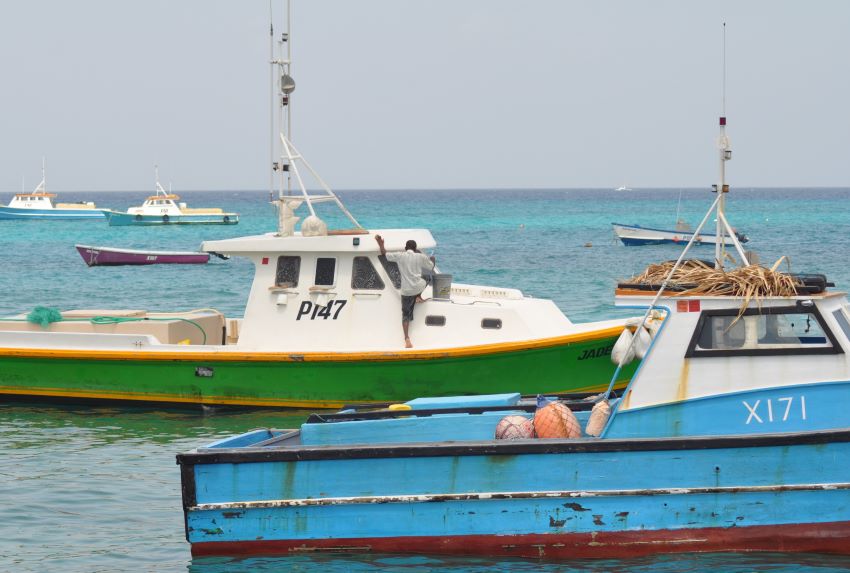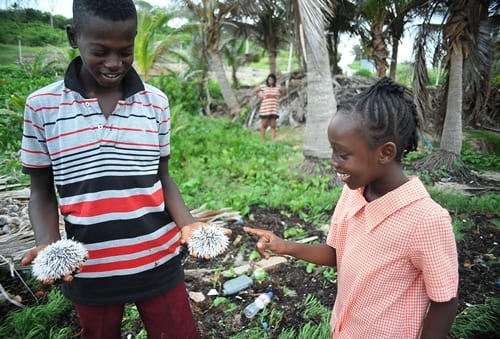
Changes are coming to the fishing industry that will change the way fishermen fish; impact the type of gear they use; the species, size and weight of fish they catch; and also set out the parameters for the open and closed seasons and prohibited areas for fishing. The new requirements are captured in the draft Fisheries Management Regulations 2021, which is presently under consultation with the fisheries sector.
Fisheries Biologist at the Fisheries Division, Christopher Parker, explained the changes during a virtual consultation with members of the fisheries sector recently.
He noted that “fish” under the Fisheries Act did not only refer to the “scaly creatures”, but included sea eggs, conchs, cetaceans, whales, dolphins and tortoises. “Fish by definition of the Act covers just about every animal that is in the sea,” he pointed out.
Mr. Parker revealed that some fishing gear presently used in Barbados, and others that are considered destructive gear, will not be allowed under the new legislation. Prohibited gear includes scuba gear and self-contained underwater breathing apparatus, for use in sea egg fishery.
“This is to reduce persons being able to denude an area of sea eggs…we want some sea eggs left in the area so that they could get together and reproduce. You don’t want barren areas of sea eggs and using this sort of gear could encourage that activity,” Mr. Parker pointed out.
He added that the regulation also speaks to any form of surface breathing apparatus where the compressor was above water, either onboard a boat or dragged along on a surface floatation device as the person dived.
Some fishing gear presently used in Barbados, and others that are considered destructive gear, will not be allowed under the new legislation. Prohibited gear includes scuba gear and self-contained underwater breathing apparatus, for use in sea egg fishery.
And, while they are not yet used in Barbados, the pelagic drift net of a size greater than 2.5 km in length, bottom set nets and travel nets will be prohibited under the new regulations.
In addition, the bottom trawl net, also not used in Barbados will be prohibited under the updated regulation. “This is usually used in shrimp and ground fish fisheries, but we don’t want any errors and anybody thinking they could use this type of monster which is dragged behind the boat and along the sea floor by bouncing over the rocks. Imagine the damage that can do to the coral reefs,” he informed.
Electro-fishing gear used to shock fish, though not presently used in Barbados will also be prohibited. However, those using spear guns must ensure that they are fitted with a safety trigger lock and a trigger guard. Spear guns without these safety features will not be allowed.
Mr. Parker added that while seine nets will not be prohibited, fishermen will have to ensure that the panels are not less than one-and-a-half inches in dimension to reduce the capture of juvenile fish.

Similarly, fishermen catching flying fish will also be required to have a minimum size gill net, while those engaged in pot fishing will have to use mesh of a specified size to avoid the capture of small fish.
During the presentation, the Fisheries Biologist further noted that any fishing net, fish pot, trap, gear, fish aggregating devices (FAD) or basic fishing equipment not registered or licensed as required will also be prohibited.
“All fish pots must be licensed by the Chief Fisheries Officer. The idea of licensing is for management purposes. We need to know how many pots are in use, who is using the pots, [and] where the pots are being deployed. This is basic monitoring and surveillance of your fishery and your management,” Mr. Parker said.
He explained that the licences would serve a similar function to licence plates on cars. “You will be given an identification tag with a specific number that corresponds to the licence, but included on this tag would be the owner’s name, contact information, and the fisherman’s identification number as issued by the Chief Fisheries Officer,” the Fisheries Biologist pointed out.
The new regulations state that no person shall deploy, set or use any fishing net, fish trap or gear, FAD, or any fishing equipment that will cause the destruction or injury to live coral or use seine nets to engage in chubbing. It will also now be illegal to spear or impale a lobster.
He added that to ensure the tags were not lost, the regulation would require them to be attached in a manner approved by the Chief Fisheries Officer to allow for the owner to be contacted should the need arise.
In addition, the new regulations state that no person shall deploy, set or use any fishing net, fish trap or gear, FAD, or any fishing equipment that will cause the destruction or injury to live coral or use seine nets to engage in chubbing. It will also now be illegal to spear or impale a lobster.
Meanwhile, the fishing, hunting, killing, harming, endangering, injuring, landing, possessing, selling or exposing for sale of specific species of fish will also be prohibited under the new legislation.
These include marine turtles, Bluefin tuna, sea cucumbers, sea doggies, sea stars, the daggernose shark, whale shark, small tooth sawfish, giant manta ray, any cetacean whether a whale, dolphin or porpoise.
The draft Fisheries Management Regulations 2021 may be downloaded by clicking here, and comments submitted to fisheries.division@barbados.gov.bb.
